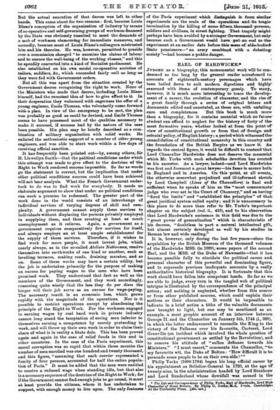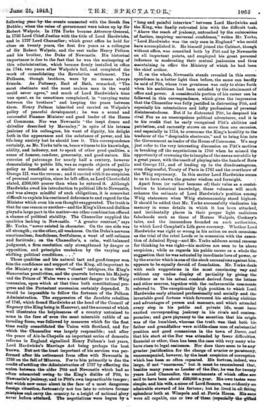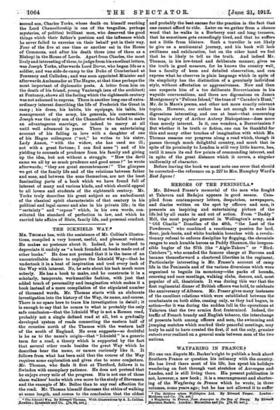EARL OF HARDWICKE:*
JUDGED as a biography, this monumental work will be con- demned as too- long by the general reader accustomed to accounts of eighteenth-century personages which have been boiled down to suit modern digestions and highly' seasoned with items of contemporary gossip. To many, however, it is much more interesting to trace the develop- ment of a career, the evolution of character, and the rise of a great family through a series of original letters and documents edited and annotated, as these ate, with unfailing care and completeness. Bet -this hook is much more than a biography, for it contains material which no future student can afford to neglect for the history of forty of•the most formative years, whether looked at from the point of' view of constitutional growth or from that of foreign and colonial policy, of English history; •a period which witnessed the consolidation of constitutional monarchy in this country an& the foundation of the British Empire as we know it. An -regards the central figure, it would be difficult to contend-that. Lord Chancellor Hardwicke does not deserve the memorial which. Mr. Yorke with such seholarlike devotion has erected to his ancestor. As a lawyer, indeed—and Lord Hardwicke was first and foremost a great lawyer—his-fameis secure both in England and in America. On this point, at all events, the otherwise somewhat prejudiced and ill-informed tketels' by Lord Campbell (Lives of the Chancellors) is -final and 'sufficient when he speaks of him as the "most consummate judge who ever sat in the Court of Chancery," and as having "fixed the limits" and "established the principles" of that great juridical system called equity ; and it is unnecessary this place to do more than refer to Mr. Yorke's important. chapter on the subject (yd. ii., 443), and to his observation that Lord Hardwicke7s eminence in this -field was due to the " great power of generalization" -which is characteristic of his decrees, "doubtless in part a natural intellectual -gift, but almost certainly developed as well by his studies in Roman law and wide reading."
It is, however, only during the last few years--since the acquisition by the British Museum of the thousand volumes- of the Hardwicke 31-SS. (in 1899); ware papers of the second Earl, and the MSS. of the Duke of Newcastle—that it has. become possible fully to elucidate the political career- and personal character of this powerful and dominating figure,- and to supersede previous inadequate accounts by a really authoritative historical biography. It is fortunate that this. work should have fallen into competent hands. So far as wee are able to judge, every turn in the tangled web of.political intrigue'is illustrated by the correspondence of the principal actors ; and nothing is neglected, whether from this source- or from other published sources, which could explain their motives or their characters. It would be impossible to indicate in a brief notice a tithe of the valuable documents. now brought to light, but one may be mentioned as an example, a most graphic account of an interview between George II. and the Chancellor on January 5th, 1744 (i., 380), In which the latter endeavoured to reconcile the King to the victory of the Pelhams over his favourite, Carteret, Lord Granville (an incident which involved the whole question of constitutional government as settled by the Revolution), and to remove his attitude of " sullen defianee towards his Ministere." "I must resort," comments the Chancellor, "to my favourite wit, the Duke of Bolton : 'How difficult it is to some people to be on their ownside l'-"
Philip Yorke (1090-1764) began his long official career by his appointment as Solicitor-General in 1720, at the age ef twenty-nine, in the administration headed by Lord Stanhope and Lord Sunderland whose downfall was caused in the
• The Life and Correspondence of Philip Yorke, Earl of Ifiardwieice, Lord Histh Chaaoellor of Groat Britain. B7 Philip C. Yorke, M.A. 3 vols. Cambridge.,
At the tIniVersity Press. Dt5s. net.] -
following year 135, the events connected with the South Sea Bubble ; when the reins of government were taken up by Sir Robert Walpole. In 1724 Yorke became Attorney-General, in 1733 Lord Chief Justice with the title of Lord Hardwioke, and in 1737 Lord Chancellor; which great office he held for close on twenty years, the first five years as a colleague of Sir Robert Walpole, and the rest under Henry Pelham and his brother, the Duke of Newcastle. His historical importance is due to the fact that be was the mainspring of this administration, which became firmly installed in office in 1744, two years after Walpole's fall, and completed the work of consolidating the Revolution settlement. The Pelhana, though brothers, were by no means always
friends. As Palteney, Earl of Bath, remarked, "The most obstinate and the most zealous man in the world could never agree," and much of Lord Hardwicke's time was spent, as he sometimes complained, in "carrying water between the brothers" and keeping the peace between them. Henry Pelham inherited and carried on Walpole's policy of peaceful development ; he was a sound and successful Finance Minister and good leader of the House of Commons. Nor was Newcastle " the inept dunce and driveller described by Macaulay," in spite of his inteaso jealousy of his colleagues, his want of dignity, his delight both in the appearance and the substance of power, and his tife-long anxiety lest he should lose it. This correspondence certainly, as Mr. Yorke tells us, bears witness to his knowledge, ability, and industry, not to speak of other good qualities, a sense of honour, candour, generosity, and good-nature. His exercise of patronage for nearly half a century, however demoralizing to public life, was as regards objects of public policy as beneficial as a similar exercise of patronage by George III. was the reverse ; and it carried with it no suspicion of personal corruption, since he left office, as Lord Chesterfield stated, £300,000 poorer than when he entered it. Although Hardwicke owed his introduction to political life to Newcastle, and was always mindful of such obligations, it is somewhat difficult to explain his continued deference to and regard for the Minister which even his son thought exaggerated. The truth is that for one reason or another—and the King's likes and dislikes played a large part in the matter—no other combination offered a chance of political stability. The Chancellor supplied the qualities lacking in Newcastle. " A greater contrast," says Mr. Yorke, "never existed in character. On the one side was all strength ; on the other, all weakness. On the Duke's nervous emotionalism, fearfulness, fretfulness, a want of self-reliance and fortitude ; on the Chancellor's, a calm, well-balanced judgment, a firm resolution only strengthened by danger or opposition, and principles unshaken by the varying and shifting political conditions. . . ."
These qualities and his natural tact and good-temper won him the confidence and support of the King, all-important to the Ministry at a time when " closet " intrigues, the King's Hanoverian proclivities, and the quarrels between his Majesty and the Prince of Wales were a constant danger to the Whig connexion, upon which at that time both constitutional pro- gress and the Protestant succession certainly depended. It would be impossible to follow the fortunes of the Pelham Administration. The suppression of the Jacobite rebellion of 1745, which found Hardwicke at the head of the Council of
• Regency (the King being in Hanover), and the account of which well illustrates the helplessness of a country untrained to arms in the face of even the most miserable rabble of an invading force; was followed by measures which for the first time really consolidated the Union with Scotland, and for which the Chancellor was largely responsible ; and after the peace of Aix-la-Chapelle an important series of domestic reforms in England signalized Henry Pelham's last years, Lord Hardwicke's Marriage Act being perhaps the best "known. But not the least important of his services was per-
-formed after his retirement from office with Newcastle in 1756 on the fall of Minorca. For to him primarily is due the
credit of settling the Administration of 1757 by effecting the union between the elder Pitt and Newcastle which had so often miscarried owing • to the King's dislike of Pitt, to -Newcastle's jealousy, and to Pitt's own impracticable temper;
but which now came about in the face of a most dangerous foreign situation, fortunately not too late to retrieve former
,mistakes and carry the country to a height of national glory never before. attained. The negotiations were begun by a "long and painful interview" between Lord Hardwicke and the King, who finally entrusted him with the difficult task. "Above the reach of jealousy, untouched by the animosities of faction, inspiring universal confidence," writes Mr. Yorke; "Lord Hardwicke was the only man in England" who could have accomplished it. He himself joined the Cabinet, though without office, was consulted both by Pitt and by Newcastle on all important points, and employed his great personal influence in moderating their mutual jealousies and thug nurintaining in office the Ministry of which he had been the chief author.
If, on the whole, Newcastle stands revealed in this corre7 spondence in a better light than before, the same can hardly be said of Pitt, whose true greatness was only to shine forth when his ambitions had been satisfied by the attainment of office and power. A considerable portion of his career can be followed in this correspondence, which gives the impression that the Chancellor was fully justified in distrusting Pitt, and especially his ostentatious and lofty professions of personal disinterestedness. But if he distrusted Pitt, ho despised his rival Fox as an unscrupulous political adventurer, and it is to his credit that he early recognized Pitt's abilities and patriotism, and earnestly strove on more than one occasion, and especially in 17,i4, to overcome the King's hostility to the traducer of the " despicable electorate," and to bring him into the Government as leader of the House of Commons. We may just refer to the very interesting discussion on Pitt's motives in breaking off the negotiations in 1760 when he missed the opportunity of crowning the triumphs of the minus mirabilis by a great peace, with the result of playing into the bands of Bute and George III., and of leading up to the disadvantageous, even disgraceful, Treaty of Paris in1762 and the overthrow of the Whig supremacy. In this matter Lord Hardwicke seems to us to have shown the greater wisdom and foresight.
Apart from (or rather because of) their value as a contri- bution to historical knowledge, these volumes will much enhance the estimate of Lord Hardwicke's position among Whig statesmen when Whig statesmanship stood highest. It should be added that Mr. Yorke successfully vindicates his memory in some details in which it has been attacked, and incidentally places in their proper light malicious falsehoods such as those of Horace Walpole, Cooksey's tales, and the innuendoes founded on such authorities, to which Lord Campbell's Life gave currency. Whether Lord Hardwicke was right or wrong in his action on such occasiona as the trial of the rebel Lords or in connexion with the execu- tion of Admiral Byng —and Mr. Yorke adduces sound reason.s for thinking he was right—his motives are seen to be above suspicion ; while as regards his public career as a whole the suggestion that he was actuated by inordinate love of power, or by the avarice which is one of the stock accusations against him, appears to be equally devoid of foundation. Mr. Yorke. deals with such suggestions in the most convincing way and without any undue display of partiality by giving the evidence as to his actual conduct derived from the letters and other sources, together with the unfavourable comments referred to. The exceptionally high position to which Lord Hardwicke early attained professionally and socially and the invariable good fortune which favoured his striking abilities and advantages of person and manners, and which attended .every step in his public and private life, must have excited corresponding jealousy in his rivals and contem- poraries; and gave piquancy to the assertion that his origin was of the humblest, whereas the truth was that both his father and grandfather were middle-class men of substantial position and good connexions in the town of Dover, and that his start at the Bar was attended by fewer difficulties, financial or other, than has been the case with very many who have risen to legal eminence. Nor does there seem to be any greater justification for the charge of avarice or parsimony, unaccompanied, however, by the least suspicion of corruption which has been so often repeated. His fortune, indeed, was large, if not "enormous," but it must be remembered that, besides many years as Leader of the Bar, he was for twenty years Lord Chancellor, the emoluments of which office are said to have been about £20,000 a year. His own tastes were simple, and his wife, a niece of Lord Somers, was evidently an admirable steward of his fortune; but be lived in all fitting splendour both at Wimpole and at .Powla House. His sons were all capable, one or two of them (especially the gifted
second son, Charles Yorke, whose death on himself reaching the Lord Chancellorship is one of the tragedies, perhaps mysteries, of politics) brilliant men, who deserved the good things which their father's position and the influence which he never failed to exercise on their behalf put in their way. Four of the five at one time or another sat in the Honse of Commons, and after his death three (one of them as a Bishop) in the House of Lords. Apart from Charles, the most lively and interesting of them, to judge from his excellent letters, was Joseph Yorke, afterwards Lord Dover, who began life as a soldier, and was aide-de-camp to the Duke of Cumberland at Fontenoy and Culloden; and was soon appointed Minister and afterwards Ambassador at The Hague, at that time perhaps the most important of diplomatic posts. A letter from him on the death of his friend, young Vanbrugh (son of the architect) at Fontenoy, shows all the feeling which the eighteenth century was not ashamed to express. There is another long one of extra- ordinary interest describing the life of Frederick the Great in camp ; his dress, his habits, his equipage, his table, his management of the army, his generals, his conversation. Joseph was the only son of the Chancellor who failed to make an advantageous marriage, or indeed to marry at all until well advanced in years. There is an entertaining account of his falling in love with a daughter of one of his Hague colleagues (" not," he writes to his sister, Lady Anson, " with the widow, she has used me ill ; not with a great fortune; I can find none ") and of his yielding to counsels of prudence from his family and giving up the idea, but not without a struggle. " How the devil came we all by so much prudence and good sense ?" he wrote afterwards; "they are great encumbrances " The glimpses we get of the family life and of the relations between father and sons, and between the sons themselves, are not the least fascinating parts of a book which we have found full of interest of many and various kinds, and which should appeal to all lovers and students of the eighteenth century. Mr. Yorke truly describes his great subject as an embodiment of the classical spirit characteristic of that century in his political and legal career and also in his private life ; in the " certainty " and " repose" which, in his own words, con- stituted the standard of perfection in law, and which he carried into affairs of State, family life, and personal conduct.












































 Previous page
Previous page